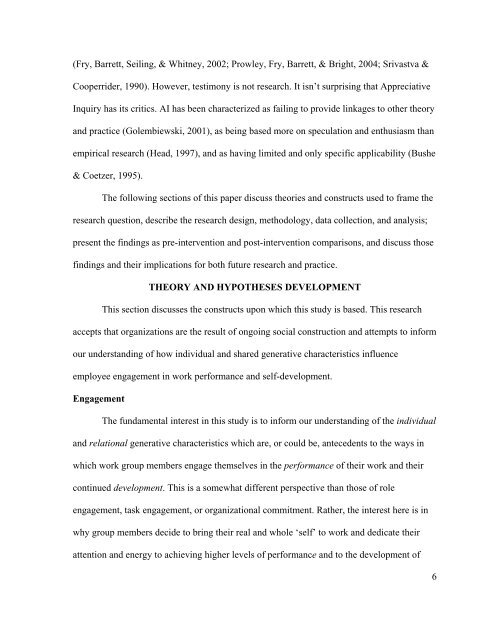GENERATIVE CHARACTERISTICS AS ANTECEDENTS OF ...
GENERATIVE CHARACTERISTICS AS ANTECEDENTS OF ...
GENERATIVE CHARACTERISTICS AS ANTECEDENTS OF ...
Create successful ePaper yourself
Turn your PDF publications into a flip-book with our unique Google optimized e-Paper software.
(Fry, Barrett, Seiling, & Whitney, 2002; Prowley, Fry, Barrett, & Bright, 2004; Srivastva &<br />
Cooperrider, 1990). However, testimony is not research. It isn’t surprising that Appreciative<br />
Inquiry has its critics. AI has been characterized as failing to provide linkages to other theory<br />
and practice (Golembiewski, 2001), as being based more on speculation and enthusiasm than<br />
empirical research (Head, 1997), and as having limited and only specific applicability (Bushe<br />
& Coetzer, 1995).<br />
The following sections of this paper discuss theories and constructs used to frame the<br />
research question, describe the research design, methodology, data collection, and analysis;<br />
present the findings as pre-intervention and post-intervention comparisons, and discuss those<br />
findings and their implications for both future research and practice.<br />
THEORY AND HYPOTHESES DEVELOPMENT<br />
This section discusses the constructs upon which this study is based. This research<br />
accepts that organizations are the result of ongoing social construction and attempts to inform<br />
our understanding of how individual and shared generative characteristics influence<br />
employee engagement in work performance and self-development.<br />
Engagement<br />
The fundamental interest in this study is to inform our understanding of the individual<br />
and relational generative characteristics which are, or could be, antecedents to the ways in<br />
which work group members engage themselves in the performance of their work and their<br />
continued development. This is a somewhat different perspective than those of role<br />
engagement, task engagement, or organizational commitment. Rather, the interest here is in<br />
why group members decide to bring their real and whole ‘self’ to work and dedicate their<br />
attention and energy to achieving higher levels of performance and to the development of<br />
6
















